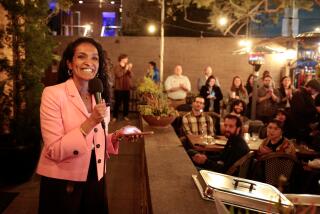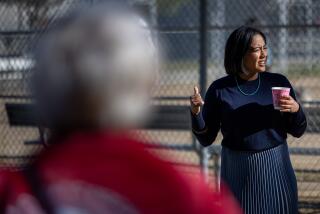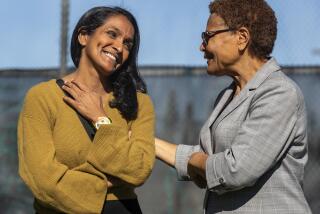Mayoral Vote Is Reversed for 2nd Time
The running melodrama of Compton politics took another turn Tuesday when an appeals court judge reinstated the elected mayor, thereby ending the brief return of former Mayor Omar Bradley, who had been restored to office by a lower court earlier in the month.
The decision by the 2nd District Court of Appeal blocks, at least temporarily, a Feb. 8 ruling by Los Angeles Superior Court Judge Judith Chirlin that replaced Mayor Eric Perrodin with his opponent, Bradley. A short time after Tuesday’s stay, the pro-Bradley City Council approved paying $840,000 of Bradley’s legal fees, as well as $43,000 in back wages.
The ruling again plunged Compton into political chaos--a state that is becoming close to the status quo in the city of 93,000, which occupies a pocket of southeastern Los Angeles County. Under the decision, Perrodin will be reinstated as mayor Thursday, pending the final outcome of the appeal.
In his appeal, Perrodin claims Chirlin exceeded her authority and abused her discretion by taking away 306 of his votes and giving them to Bradley. Bradley has been mayor since Chirlin ousted Perrodin earlier this month.
“The city’s in limbo,” said Yvonne Arceneaux, the only member of the City Council who supported Perrodin. “We’re without a mayor. We’re without leadership, and it’s really unfortunate.” She noted that the city has two city managers and two assistant city managers on the payroll, the legacy of its in-again, out-again mayors.
Chirlin ruled that Perrodin unfairly benefited from having his name appear first on the June 5 ballot, citing the “primacy effect” theory put forth by an expert witness. That theory held that some voters cast ballots for Perrodin only because his name appeared before Bradley’s.
Bradley’s attorneys argued that Compton officials had erred by not randomly selecting the order of candidate names on the June ballot. The names appeared in the same order in the primary election.
The appellate court justices said the primacy effect theory--and whether it was properly applied--was among several “significant and substantial issues” that need to be decided before changing the outcome of the election. Perrodin beat Bradley by 281 votes.
“I’m happy and elated,” said Perrodin in a telephone interview. “But I’m more elated for the citizens of Compton. [Chirlin’s] judge’s ruling disenfranchised the voters of Compton. She imposed her will on the voters.”
Perrodin said he had sought the urgent stay from the appeal court despite the turmoil he knew it could cause.
“It’s probable that some people will be upset about this,” he said. “I’m trying to change the image of Compton. I don’t want to do anything that would tarnish the image.”
Bradley, who served two terms as mayor before losing to Perrodin, could not be reached for comment. Councilman Amen Rahh said Bradley and his family were “devastated” by the reversal of fortune.
Bradley was convening a City Council meeting Tuesday afternoon when his son, Omar Bradley Jr., dashed in through a side door and whispered the news of the ruling to his father. The council decided to adjourn to a closed session, which is allowed for discussing legal or personnel issues.
Before the closed session could begin, City Atty. Legrand H. Clegg II was escorted out by security guards after saying he felt threatened by the younger Bradley, who had been seen making faces and pointing at him. Clegg was escorted to his car by sheriff’s deputies, who were ordered to keep watch on his house overnight, said Capt. Cecil Rhambo, commander of the sheriff’s Compton substation.
When the council reconvened Tuesday night, Rahh and another council member charged that Clegg had “lured” Bradley to file the claims for legal fees and back pay to give Perrodin ammunition for his legal fight.
Legal experts said courts of appeal grant stays on such issues if they believe there exists a substantial probability that the appealing party will prevail. Courts also consider whether irreparable harm will result if a lower court ruling stands.
In this case, the court took the unusual step of considering Compton residents in their analysis, saying its decision would “serve to prevent irreparable harm to the voters of the city of Compton.”
The quick action by the court was expected by legal experts, given the unusual basis of Chirlin’s ruling. Some experts said Tuesday’s decision sends a strong signal that an appeals court is likely to overturn Chirlin.
“The fact they moved quickly is not surprising,” said Rick Hasen, a Loyola University elections law professor who once served as a consultant in Compton. “Every day that goes by makes it harder to go back to the status quo with Perrodin as mayor.”
The decision Tuesday came one day after lawyers debated the case in a downtown Los Angeles courtroom packed with about 90 supporters of Bradley and Perrodin. Dozens of others waited outside.
During the hourlong debate, the jurists seemed skeptical of the primacy effect theory as they posed questions to Bradley’s attorney, Bradley Hertz.
Associate Justice Reuben Ortega asked why the primacy effect didn’t seem to help another candidate in the primary election who was listed above Perrodin and Bradley but got fewer votes.
Ortega also asked if the primacy effect would now make all elections open to legal challenge. Hertz replied that the theory could be used to contest narrow victories.
Presiding Justice Vaino Spencer asked Hertz the population of the Ohio county that the expert witness, Ohio State University professor Jon Krosnick, had used in the study that he applied to Compton. At one point Spencer seemed incredulous when Hertz said that differences in demographics wouldn’t affect the analysis.
“I’m surprised you say that,” she said to Hertz, claiming that Krosnick had noted demographics as an important factor in his initial study.
Hertz responded by saying that Krosnick’s research had evolved since his initial study, and that demographic factors can now be factored into any analysis.
Spencer also wanted to know how much Krosnick prepared before testifying.
The justices noted that some of the expert’s research involved searches of newspaper articles to see how much publicity the race had generated.
Ortega also pointed out that Perrodin’s campaign had not been found to have committed any wrongdoing, and that the judge had found that only nine votes were found to be illegal.
(BEGIN TEXT OF INFOBOX / INFOGRAPHIC)
Compton’s Mayoral Dispute
April 2001: Deputy District Attorney Eric J. Perrodin wins 20% of the vote for mayor to Omar Bradley’s 44%, forcing a runoff election.
June: Perrodin beats Bradley in the mayoral runoff election by a slim margin. Bradley asks Los Angeles Superior Court Judge David Yaffe to issue a temporary restraining order to stop official certification of the vote, alleging fraud; the judge denies his request.
July: The Compton City Council certifies the election results.
August: Bradley files suit in Los Angeles Superior Court alleging massive election fraud in the June runoff election.
Nov. 13: The election fraud trial begins. A witness expected to support Bradley’s charges of election fraud instead says Bradley’s attorney tried to bribe him.
Nov. 21: Los Angeles Superior Court Judge Judith Chirlin orders nearly 30,000 used and unused ballots to be inspected but no evidence of counterfeit ballots is found.
Nov. 28: Perrodin testifies that, although he was carrying a concealed gun when he visited a polling place during his June election, he denies allegations that he intimidated voters there.
Jan. 9, 2002: Chirlin says that Compton City Clerk Charles Davis “failed in his duties” to properly supervise the June 5 mayoral election, but rules that the resulting errors did not affect the election’s outcome. Jan. 26: After closing arguments, the case is turned over to Chirlin to decide.
Feb. 8: Chirlin replaces Perrodin as mayor with Bradley after ruling that Perrodin unfairly benefited from being listed first on the June ballot.
Feb. 26: The 2nd District Court of Appeal blocks the trial ruling, returning Perrodin to office and giving Bradley until 4 p.m. Thursday to vacate the office.
Graphic reporting by TRACY THOMAS / Los Angeles Times
Source: Times news files
*
Times staff writers Mitchell Landsberg and Peter Y. Hong contributed to this report.
More to Read
Start your day right
Sign up for Essential California for news, features and recommendations from the L.A. Times and beyond in your inbox six days a week.
You may occasionally receive promotional content from the Los Angeles Times.







